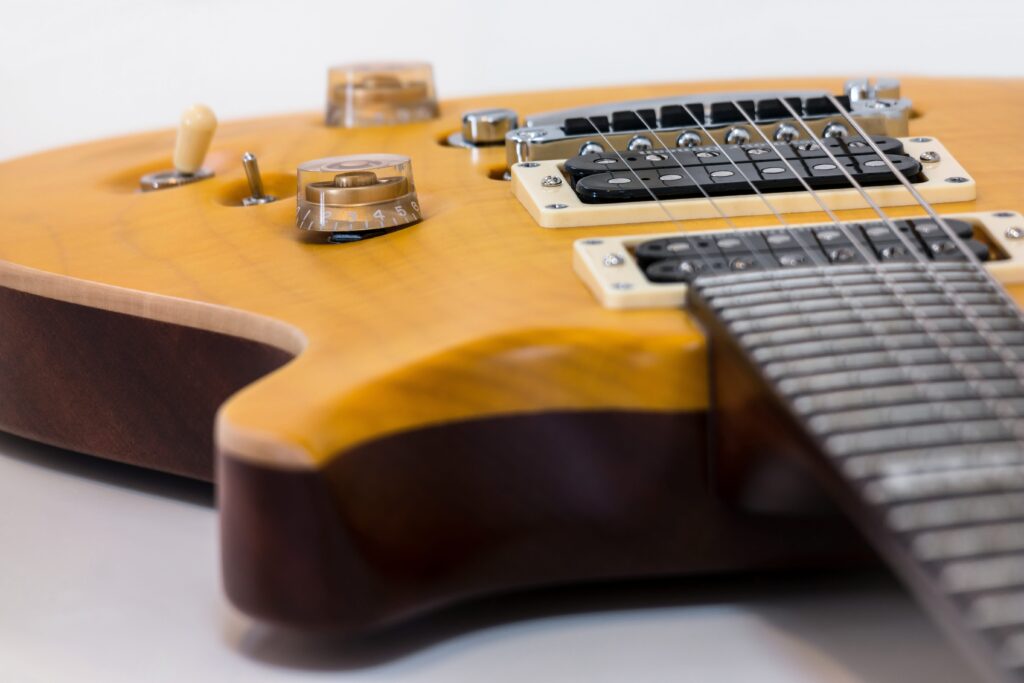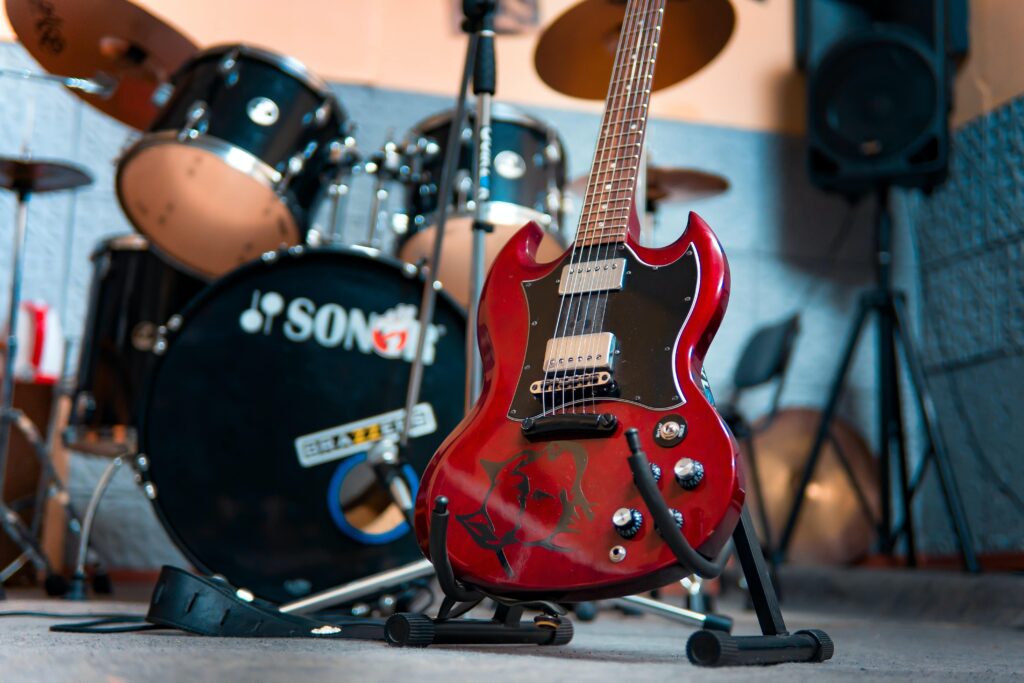
In this article, we shall discuss all you need to know about guitar string gauges. Let’s look into various string gauges for electric guitar, acoustic guitar and classical-nylon string guitar.
Let’s discuss how different string gauges affect the tone, sound and playability of each type of guitar. Also will finalise which string gauge is the best to choose.
Electric guitar string gauges
Electric guitars strings are made up of steel core with nickel, steel, chrome, cobalt, polymer and even titanium coatings. These strings are available in different sizes and names. Such as (numbers denote gauge for high E string to low E string) :
- Extreme or Extra Super Light: 0.008 – 0.038
- Super Light: 0.009 – 0.42
- Light/Normal Gauge: 0.010 – 0.46
- Medium or Heavy Gauge: 0.011 – 0.050
- Super Heavy Strings: 0.012 – 0.054

Which electric guitar strings to buy?
Depending upon playing style, frequency of playing and the type of music you play, you have to choose the right string gauge.
It is important to note that a lighter gauge string will enhance the comfortability and ease of playing the guitar. But, will have tuning issues and will not project a brighter or fuller sound.
On the other hand, a heavy-gauge string will enhance your tone, have tuning stability, but will require more effort to play and bend.
A pack of Normal gauge strings are considered an “all-rounder” as they are adaptable for all kinds of playing style.
Therefore, a light gauge string is usually recommended, if you are a beginner guitarist or apply a lot of bending techniques in your playing. I usually choose a pack of Daddario or Slinky pack by Ernie Ball.

Similarly, it is recommended to usually go for heavy or super heavy-gauge, if you are a heavy-handed player or play genres that require drop-tuning.
However, if you like to have the best of both worlds, there are plenty of guitar string manufacturers who make “hybrid string packs”.
For example, Ernie Ball’s Hybrid Slinkies comes with a heavy gauge for the low 3 strings and a lighter gauge for the top 3 strings.
This way, it makes it easier for the player to riff and solo over the guitar fretboard.
Acoustic guitar string gauges
Just like the electric guitar, acoustic guitar strings also come in various gauges. They are made up of steel core with bronze, phosphor bronze, aluminium/bronze, brass or polymer coatings. Here are a few string gauges listed below (numbers denote gauge for high E string to low E string) :
- Extra light gauge: 0.010 – 0.047
- Custom light gauge: 0.011 – 0.052
- Light gauge: 0.012 – 0.054
- Medium gauge: 0.013 – 0.056
- Heavy gauge: 0.014 – 0.059

Which acoustic guitar strings to buy?
For starters, a lighter gauge string is usually recommended, if you are into fingerpicking. Also, a light gauge string is to be used if you have a small body guitar such as a grand auditorium or even smaller guitar such as a parlour guitar -.
Similarly, a heavy gauge string is the best choice, if you are heavy-handed and your music requires a lot of strumming with a dreadnought or jumbo guitar.
Classical guitar string gauges
Just like every other type of guitar, classical guitars also have various string gauges. The strings are usually made up of nylon/titanium/animal gut core with bronze/zinc or silver coatings.
The gauges in which these strings come are as follows:
- Light tension – perfect for students and beginners or someone who likes to do legato runs. But produce lower sound projections.
- Normal-tension – a perfect balance between light and hard tension strings.
- Hard tension – perfect for achieving higher sound projections and superior tone. However, fretting the notes become slightly uncomfortable.

CAUTION: Before you shift to heavy gauge guitar strings…
It is highly recommended to not use heavy gauge strings, in case you have a vintage or old guitar. It causes damage to the neck and even damages the bridge and saddle for acoustic or classical guitars.
Also, if you are using light gauge strings on your guitar from the day you bought it, do not switch to heavy gauge right away. The immediate change in the tension may cause damage to the neck and affecting the whole guitar.
Hence, it’s always best to change the string gauge one tension at a time. For example, light gauge > normal gauge > heavy gauge.
How often should I change my guitar strings?
- It depends upon your playing frequency and the style of playing. As a standard practice, if you are facing tuning issues, strings are rusted or show any form of discolouration, you should consider replacing them with a fresh pack.
- It is recommended to replace all strings in one go, rather than changing only a few strings as per requirement. This enables you to keep a track of your string change history and does not allow variations in your guitar tone.
How to maintain my guitar strings and make them last longer?
The best possible way to maintain your strings is to do the following:
- Always keep a clean cloth handy and wipe down your strings from the nut to the bridge. This should be done each time after you finish your playing session.
- Ensure your guitar is in your gig bag if it is not in use. Weather and humidity change badly affect the strings and the neck bow of the guitar. Therefore, it is a good practice to store your guitar properly.
- If you have lots of guitars it is best to keep them in a special cabinet or room which actively regulates the temperature and humidity of the surroundings. Though this set-up is expensive, it will take care of your guitars if you own premium and high-end guitars.
Can I put acoustic guitar strings on the electric guitar?
The answer is NO. Acoustic guitar strings have higher tension in order to project more sound and vibrations from the soundhole. If they are put on the electric guitar, the neck will be seriously damaged. As the “light” gauge of an acoustic guitar is far different from that of an electric guitar.




